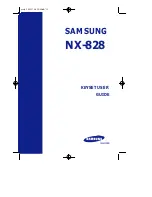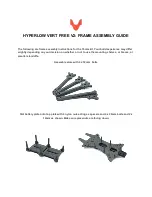
5. Refer to
E. Vertical Pattern Adjustment
and Table 1 for recom-
mended detector pattern setting for various mounting heights and
protection ranges.
6. Replace front cover.
D. Horizontal Adjustment of Lens
The protection pattern can be moved to the left or right by horizontal
adjustment as follows:
1. Remove front cover.
2. Release the lens frame as shown in Figure 4.
3. Grasp the lens firmly on both sides (front and back) and slide the
lens to the left or right, as needed. The lens may be moved as much
as 4¡ (from center) in either direction.
4. Replace lens, lens frame and the front cover.
After adjustment, conduct a Walk-Test to ensure proper coverage of
the area to be protected (see
TEST PROCEDURES
).
E. Vertical Pattern Adjustment
The protection pattern can be raised or lowered by repositioning the
PC board in the detector. A graduated scale to the left of the board
(see Figure 5) indicates the approximate number of degrees by which
the pattern can be raised (max. +5¡) or lowered (max. -20¡). To make
this adjustment, slide the board upward or downward by the number
of degrees required. After any adjustment, conduct a Walk-Test to
ensure proper coverage of the area to be protected (see
TEST PROCE-
DURES
).
Table 1 indicates the recommended setting at various mounting
heights.
F. Lens Masking
The supplied masking strips can be used to produce a protection pat-
tern that suits the particular requirements of the protected area, or
eliminate coverage from areas where you anticipate environmental
disturbances that might reduce the PIRÕs stability (a heater or other
heat-producing object, for example). Simply peel off the appropriate
pressure-sensitive adhesive strip(s) and apply over the desired lens
segment(s). Be sure to affix the masking strips to the
inside
of the
lens (not the outer, smooth side). Each lens segment that is masked
results in the elimination of one zone of protection from the coverage
pattern.
Figure 1. Cover Removal
Figure 2. Detector Base
Figure 3. Corner Mounting
Figure 4. Changing Lenses
Figure 5. Wiring Connections
WIRING CONNECTIONS
Bring all wires in through the wire access slot at the top of the detec-
tor base (near the terminal block) and connect to the screw terminals
(see Figure 5 for wiring details). Seal any openings in the base with
foam or RTV (not supplied) to prevent drafts or insects from entering
the unit.
Apply power only after all connections have been made and
are inspected.
LED ENABLE/DISABLE OPTION
To enable the LED,
set the DIP switch #1
DOWN
(see Figure 5 for
switch location). To disable the LED, set DIP switch #1
UP
. Use a
small pointed tool to move the switch handle up or down.
PULSE COUNT OPTION
For Intermediate Pulse Count,
set the Pulse Count DIP switch #2
UP
(see Figure 5 for switch location).
For Standard Pulse Count,
set DIP switch #2
DOWN
. Use a small pointed tool to move the
IMPORTANT
NOTE THE MOUNTING
ORIENTATION OF THIS
DETECTOR. WIRE ENTRY
IS AT THE TOP, AND LENS
IS AT THE BOTTOM!
▲
(1) INSERT SCREWDRIVER
IN GROOVE AND TWIST
▲
(2) REMOVE
COVER
CORNER
OF
WALL
DETECTOR
BASE
1
2
3
4
ALARM
LED
TO CLOSED
CIRCUIT
PROTECTIVE LOOP
12VDC POWER
CONNECTS
HERE
(OBSERVE
POLARITY)
MARKER
VERTICAL
ADJUSTMENT
SCALE
+5˚
-0˚
-5˚
-10˚
-15˚
-20˚
DET
TERMINALS:
1-12VDC (+)
2-12VDC (–)
3-
4-
RELAY
(OPENS
ON ALARM)
–
+
WIRING
DETAILS
1
2
3
4
•
}
+ 12V –
RELAY
DIP
SWITCH
NOT
USED
PULSE
COUNT
LED
ENABLE/
DISABLE
#1: UP
= LED DISABLE
DOWN = ENABLE
#2: UP
= INTERMEDIATE PULSE COUNT
DOWN = STANDARD PULSE COUNT
DIP
SWITCH
5-
6-
TAMPER
(998EXPI
ONLY)
}
5
6
TAMPER
5
6
TO TAMPER LOOP
(998EXPI ONLY)
TAB
TAB
LENS
FRAME
LENS
(SMOOTH
SIDE
FACING
OUTWARD)
INSERT BLADE
UNDER TAB AND
LEVER INWARD TO
RELEASE EACH
CORNER OF LENS
FRAME, THEN
REMOVE LENS
FRAME.
LED
+5˚
-0˚
-5˚
-10˚
-15˚
-20˚
+ 12V –
RELAY
A
X2
X1
A
A
A
B
B
B
B
KNOCKOUT HOLES
A = SURFACE
MOUNTING (4)
B = CORNER
MOUNTING (4)
X1 = TOP WIRE ENTRY
(SURFACE WIRING)
X2 = REAR WIRE ENTRY
(IN-WALL WIRING)
998EXPI
ONLY
TAMPER






















